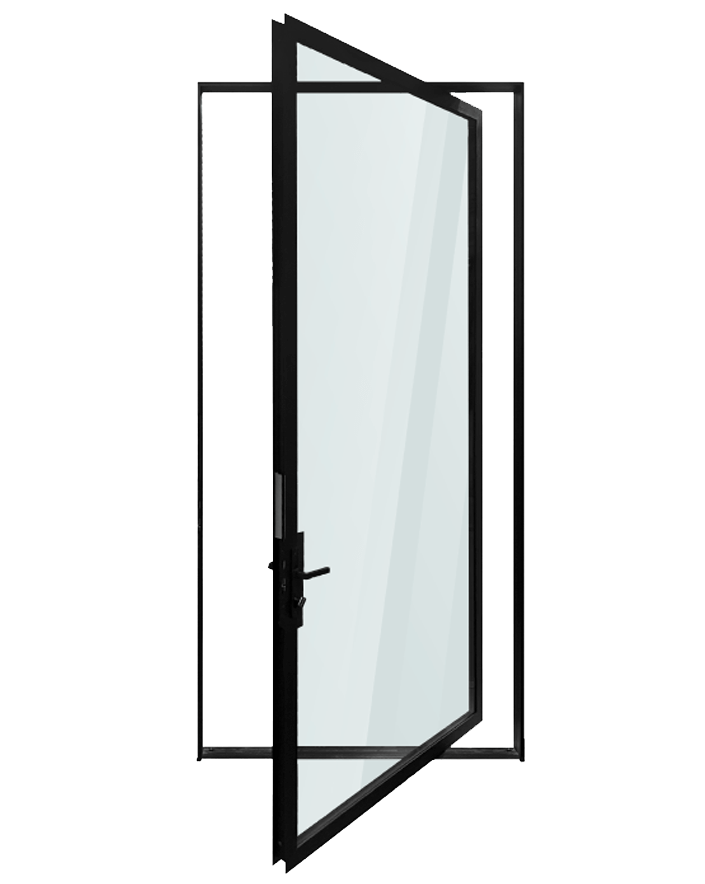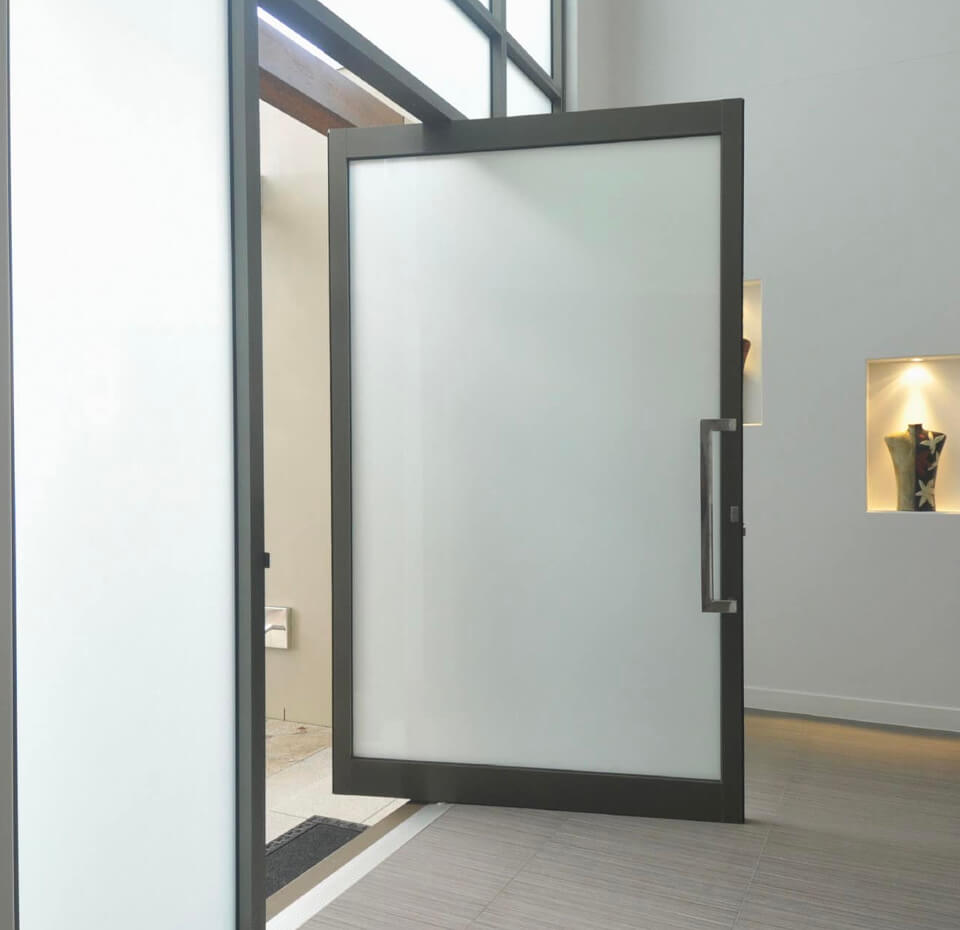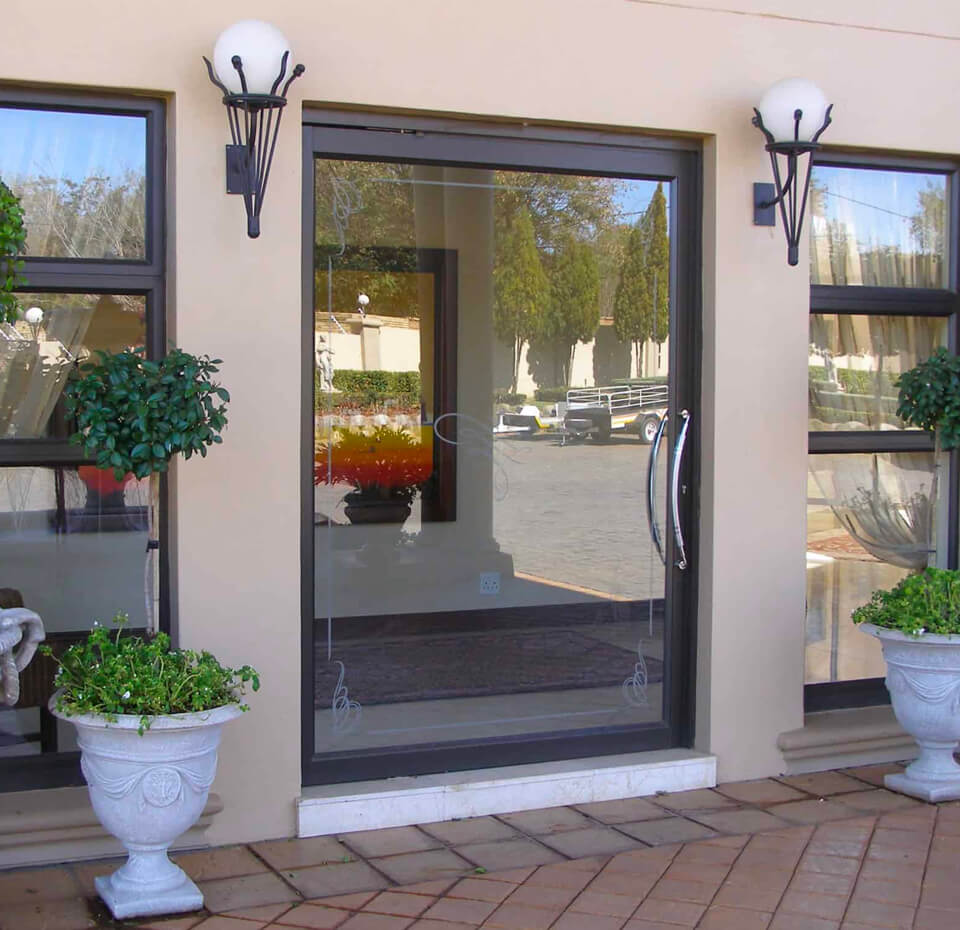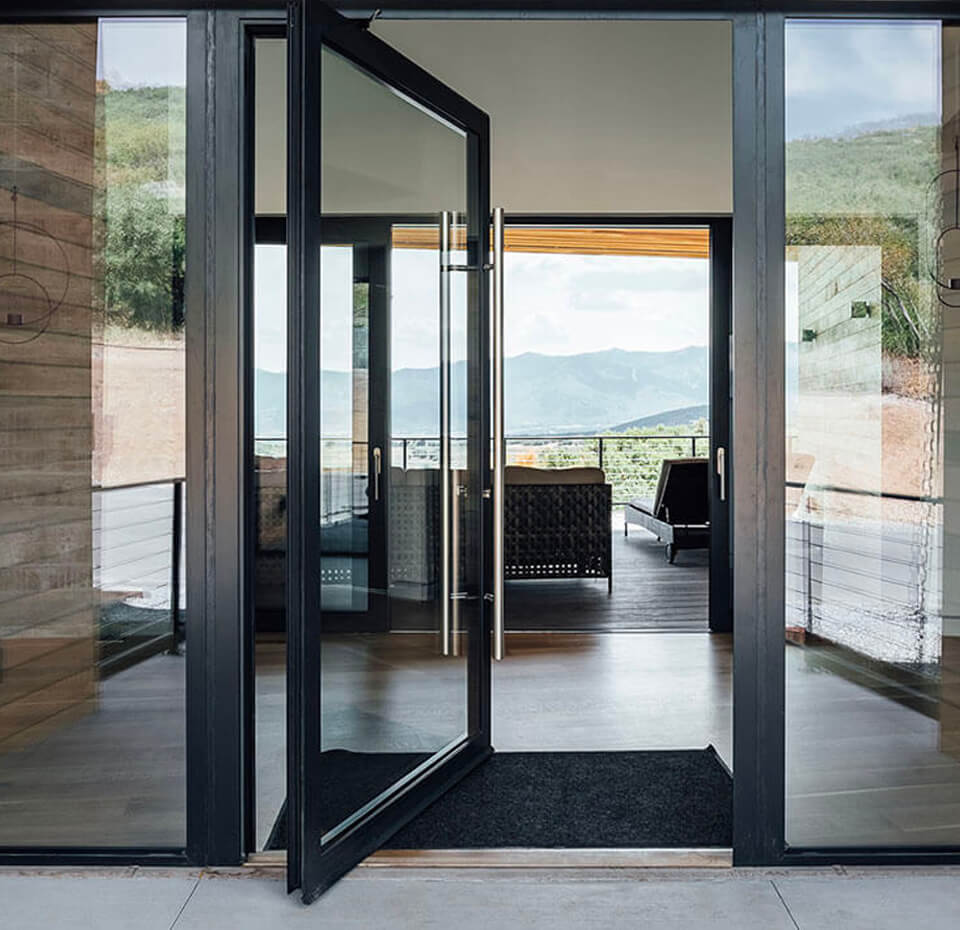Pivot Doors
Imagine entering a space that seamlessly combines elegance and functionality, making a bold statement while providing convenience and ease of use. This is precisely what a pivot door offers. In this article, we will explore the concept of pivot doors, their advantages, and why they have become increasingly popular in modern architectural designs. So, let’s dive into the world of pivot doors and uncover their captivating features.
UNq DOORS
The Perfect Blend of Style and Functionality
A pivot door is a type of door that rotates on a pivot hinge, allowing it to swing open and closed. Unlike traditional hinged doors that rely on a side-mounted hinge, pivot doors pivot on a central axis, which can be located at the top and/or bottom of the door. This unique mechanism provides several advantages in terms of design, functionality, and accessibility.
Pivot doors operate on a simple yet efficient mechanism. They rely on a pivot hinge system, which consists of a pivot point located either at the top, bottom, or both ends of the door. This pivot point allows the door to rotate smoothly, distributing the weight evenly and reducing stress on the frame. The use of a pivot hinge enables larger and heavier doors to be effortlessly opened and closed with minimal effort.
Enhanced Functionality:
Pivot doors provide a wider opening arc, making it easier to move large furniture or objects through the doorway. This feature is especially beneficial for commercial spaces that require the transportation of bulky items.
Stylish Design:
Pivot doors exude elegance and sophistication, adding a touch of luxury to any interior or exterior. With their sleek and minimalistic appearance, pivot doors can transform a mundane entryway into a visually stunning focal point.
Increased Natural Light:
Due to their larger size, pivot doors allow more natural light to flow into the space, creating a brighter and more inviting atmosphere. The abundant natural light can also help reduce energy consumption by minimizing the need for artificial lighting during the day.
Improved Accessibility:
The pivot mechanism eliminates the need for traditional door frames, resulting in a more open and accessible pathway. This feature is particularly advantageous for individuals with mobility challenges or those who require the use of assistive devices.
Versatile Design Options:
Pivot doors offer endless design possibilities. They can be crafted from various materials such as wood, glass, metal, or a combination of these, allowing for customization to match any architectural style or interior design theme.
Durability and Security:
Pivot doors are constructed using robust materials, ensuring durability and longevity. Additionally, the pivot system distributes the weight of the door evenly, reducing stress on the hinges and enhancing overall security.
Acoustic Insulation:
Pivot doors can be designed to provide excellent acoustic insulation, minimizing noise transmission between rooms. This feature is especially important in residential or commercial settings where privacy and tranquility are paramount.
Space Optimization:
Unlike traditional doors that swing inward or outward, pivot doors rotate on a central axis, requiring less space for operation. This compact footprint allows for efficient use of limited spaces, making pivot doors an excellent choice for small rooms or areas with restricted access.
European Style Pivot Doors
Enhancing Aesthetics with Pivot Doors
The use of pivot doors can elevate the aesthetics of any space. With their large surface area and seamless design, pivot doors make a striking visual impact. They create a sense of grandeur and openness, inviting natural light to flow through and enhancing the overall ambiance. Additionally, pivot doors can be designed with minimalistic frames or even frameless, further accentuating their elegance and creating a sleek, contemporary look.
Space-Saving Benefits of Pivot Doors
In today's compact living spaces, maximizing every square inch is crucial. Pivot doors offer a space-saving solution, particularly in areas where traditional swinging doors may be impractical. Since pivot doors rotate on a central axis, they require less clearance space compared to conventional doors. This feature makes them ideal for tight spaces, such as small rooms, corridors, or areas with furniture or fixtures in close proximity.
The Impressive Durability of Pivot Doors
When it comes to durability, pivot doors excel. The pivot hinge system distributes the weight of the door evenly, reducing stress on the frame and ensuring smooth operation for years to come. Additionally, pivot doors are often constructed using high-quality materials and advanced manufacturing techniques, making them highly resistant to warping, twisting, and sagging. This durability factor contributes to their long lifespan, making them a wise investment for any property owner.
Pivot Door: A Versatile Architectural Solution
Accessibility is an essential consideration in modern architecture. Pivot doors provide an excellent solution for individuals with mobility challenges or those requiring wheelchair access. Their wide opening and smooth operation make it easier for people with limited mobility to navigate through doorways without obstacles or restrictions. This inclusive design approach ensures that everyone can enjoy seamless access to various spaces.
Installing a pivot door requires the expertise of professionals due to its unique mechanism and weight distribution. It is crucial to ensure precise installation to guarantee optimal functionality and longevity. Regular maintenance is also essential to keep the door operating smoothly. This may include lubricating the pivot hinges, inspecting the frame for any signs of wear or damage, and cleaning the door surface using appropriate materials and methods.
In an era where energy efficiency is paramount, pivot doors have stepped up to the challenge. The sealing capabilities of pivot doors, combined with their large surface area, contribute to excellent insulation properties. When properly installed and fitted, pivot doors can minimize air leakage, prevent drafts, and reduce energy consumption. This feature not only enhances comfort but also contributes to lower energy bills and a more sustainable living environment.
Security is a top priority for any property owner. Pivot doors can be equipped with high-quality locking mechanisms, enhancing the overall security of your space. Furthermore, their sturdy construction and durable materials make them resistant to forced entry attempts. By choosing a pivot door with robust security features, you can enjoy peace of mind knowing that your property is well protected.
Pivot doors are not limited to residential settings; they have gained popularity in commercial spaces as well. The impressive size, striking design, and ease of use make them an excellent choice for various establishments, such as hotels, restaurants, offices, and retail stores. Pivot doors can create a memorable entrance, leaving a lasting impression on visitors while maintaining functionality and accessibility.
The cost of pivot doors can vary depending on several factors, including size, material, design complexity, and additional features. While pivot doors may have a higher upfront cost compared to traditional doors, they offer long-term value and durability. It is essential to consider the overall benefits and lifespan of pivot doors when evaluating their cost-effectiveness.
As architectural trends continue to evolve, pivot doors are expected to play a significant role in shaping the future of design. Their ability to combine style, functionality, and accessibility makes them a compelling choice for architects and homeowners alike. With advancements in technology and materials, we can anticipate even more innovative designs and features in pivot doors, further pushing the boundaries of architectural possibilities.
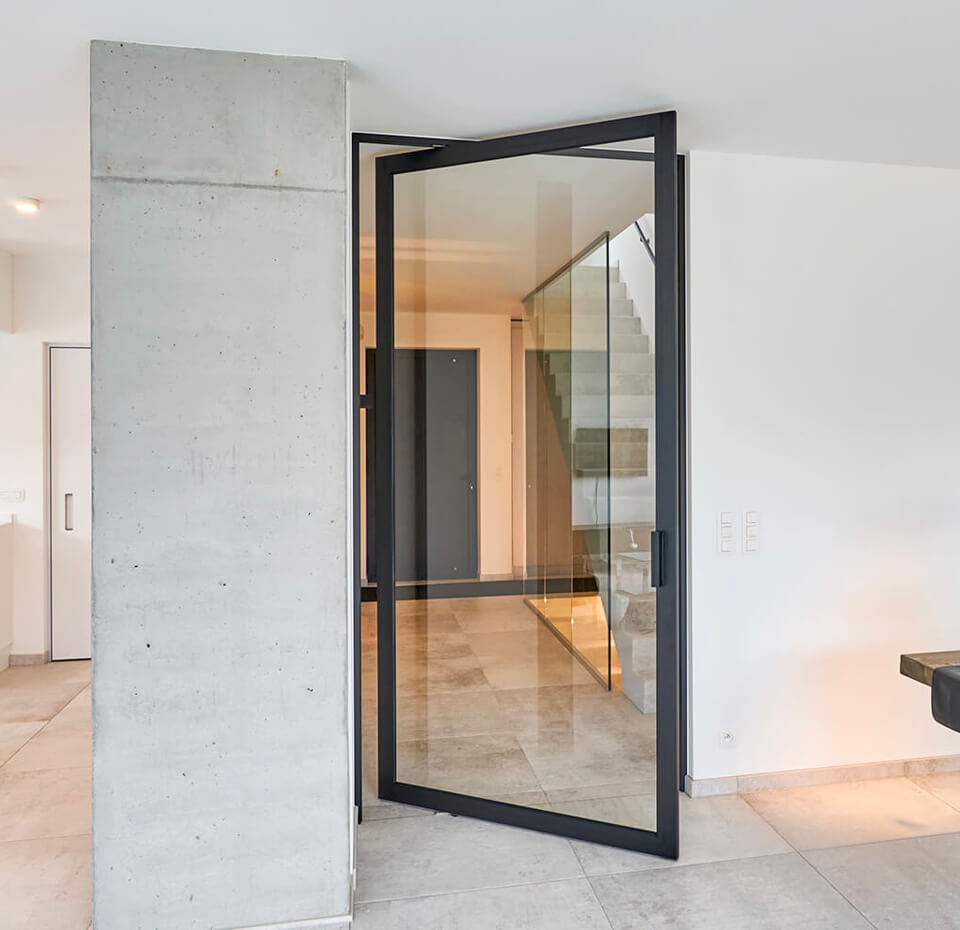
Material Selection
Wood: Natural wood finishes provide warmth and timeless appeal to pivot doors. Popular wood species include oak, mahogany, walnut, and teak. Wood can be stained, painted, or left untreated to showcase its natural beauty.
Glass: Glass pivot doors are ideal for those who seek a modern and minimalist aesthetic. Frosted or textured glass can be used to enhance privacy while still allowing natural light to filter through.
Metal: Pivot doors crafted from metal, such as steel or aluminum, offer a contemporary and industrial look. Metal doors can be powder-coated in various colors to match the overall design scheme.
Size and Shape
Single Pivot: A single pivot door features a single panel that rotates on a pivot point, providing a clean and simple design.
Double Pivot: Double pivot doors consist of two panels that open from the center, creating a striking and symmetrical entryway.
Custom Shapes: Pivot doors can be customized to fit unique architectural requirements. Arched, circular, or irregular shapes can add an artistic and distinctive touch to the design.
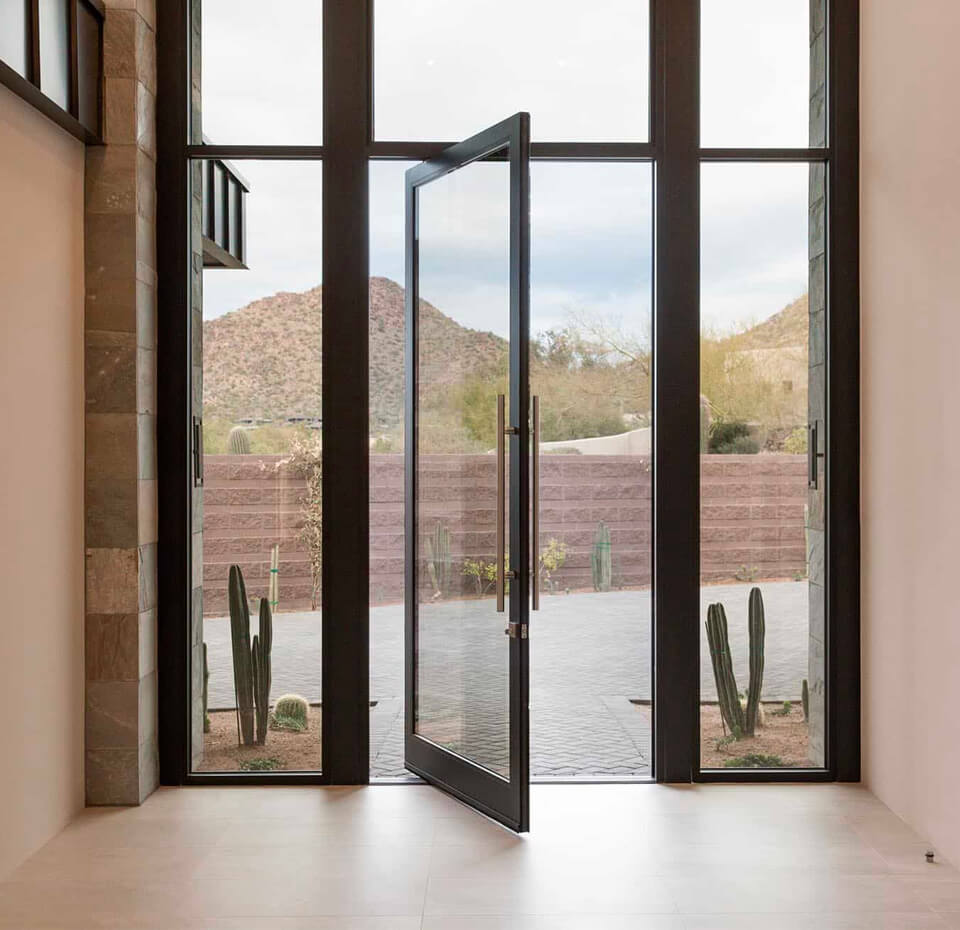
Hardware and Accessories
Handles: Choose from a wide array of handle designs, ranging from sleek and contemporary to ornate and traditional. Handles can be made from various materials, such as stainless steel, brass, or even leather-wrapped for a luxurious feel.
Hinges and Pivot Systems: High-quality hinges and pivot systems are crucial for the smooth operation and longevity of pivot doors. Opt for durable and reliable hardware that can support the weight of the door and withstand constant use.
Security Features: Consider incorporating advanced locking mechanisms and security systems to ensure the safety of your property.
Integration with Surroundings
Indoor/Outdoor Connection: Pivot doors can seamlessly merge indoor and outdoor spaces, blurring the boundary between the two. This integration allows for an uninterrupted flow and creates a sense of harmony with the surroundings.
Architectural Accents: Pivot doors can serve as architectural accents, highlighting specific features or views. Large glass panels, for example, can frame breathtaking landscapes or showcase stunning architectural elements.
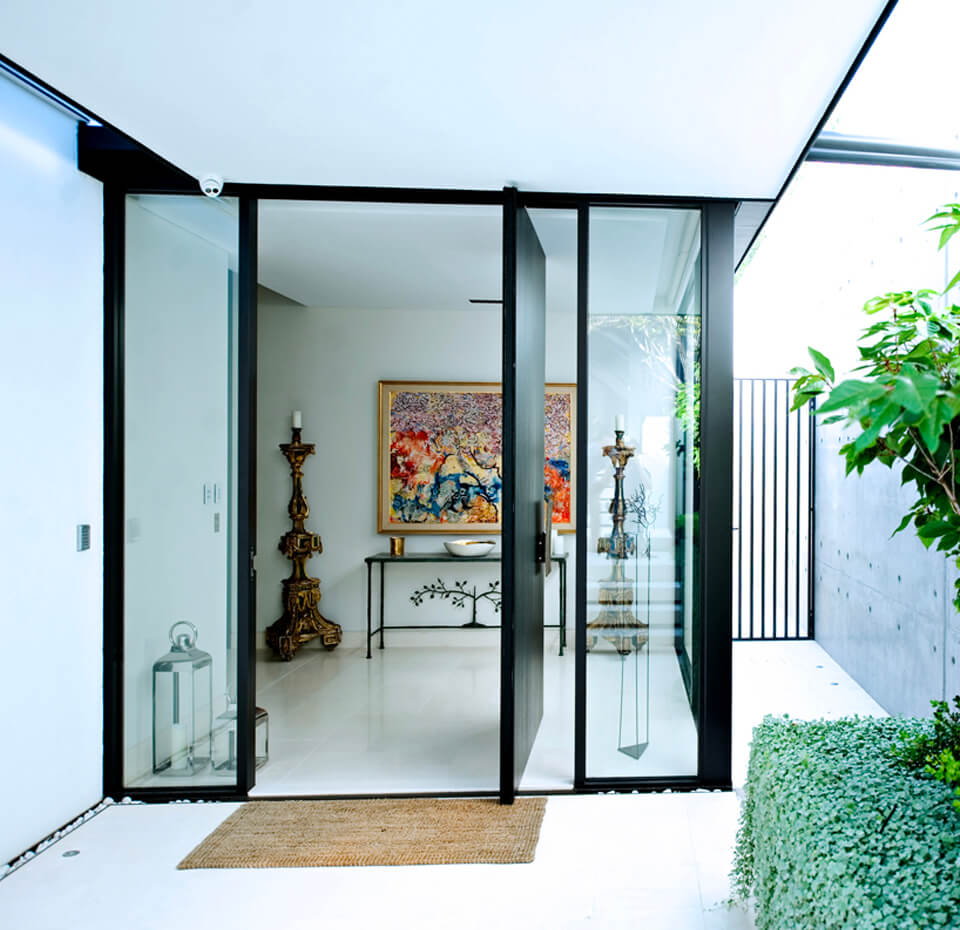
A Solution for Accessibility
Energy Efficiency
Securing Your Space
Ideal for Commercial Spaces
Contact Us
